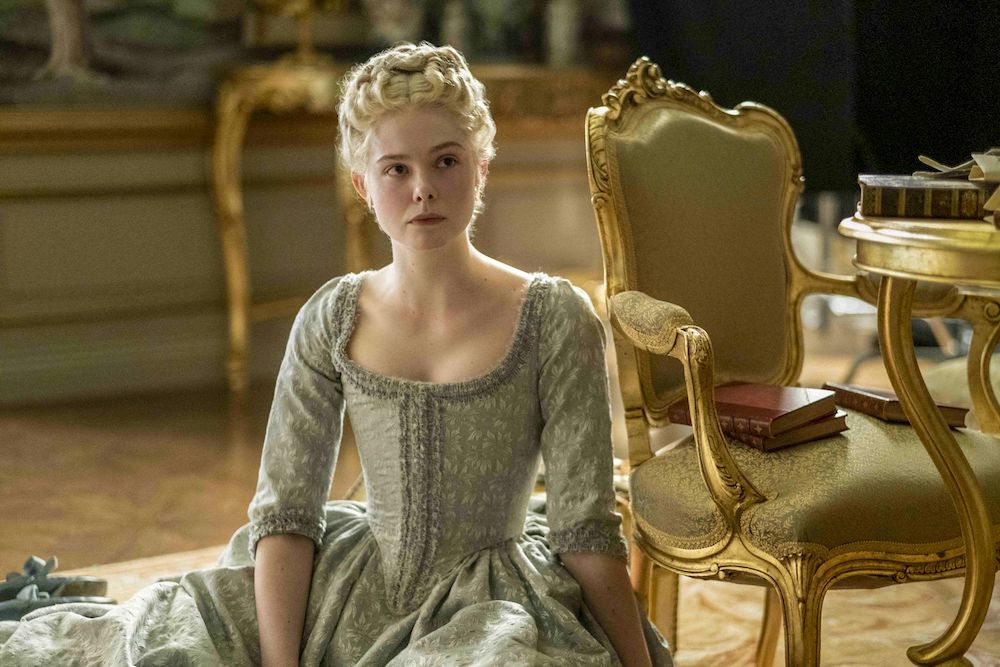At a glance, the Yorgos Lanthimos film “The Favourite” and Hulu’s new satirical drama “The Great” have quite a bit in common. Chief among its shared qualities—and an explanation for many of them—is the presence of writer Tony McNamara, an Oscar nominee for the screenplay of the former and the creator and showrunner of the latter. There are also the acidic barbs and jubilant profanity, the frank and explicit sexual content, and an endlessly appealing insouciance with regard to the dignity of lofty historical figures. Each possesses this one key quality, central to what makes both film and series so successful (and successful they are): they are, throughout, both wickedly funny and deadly serious, in possession of actors willing and able to approach the absurdity with all the gravity of a funeral march or one of Shakespeare’s great mad scenes. (And seriously, the cursing is top-notch.)
But what’s most interesting about “The Great” is that which makes it a fundamentally different beast than McNamara’s earlier effort: Despite all that acidity, this is at heart an idealistic, optimistic story—even if that optimism puts its characters at terrible risk. It’s about the death of naivete and the birth of something just as pure but far more potent. In its ten-episode first season, “The Great” charts the transformation of Catherine, Empress of Russia (Elle Fanning) from guileless romantic to political animal; it is not an easy path, which was true for the real Catherine as well. (The series kindly reminds viewers near the top of each episode that this is, at most, an “occasionally true story.”) That idealistic streak does not make “The Great” any less funny or chaotic, but it does serve to anchor it in something appealingly innocent and well-intentioned. Catherine dreams of a better world, and “The Great” seems to believe that even now, such a world is possible.

Of course, some of that heady romantic streak can be credited to Fanning (also a producer), who finds many shades between the naive Catherine who begins the series and the disillusioned one who ends the first season. When Catherine, an Austrian teenager dreaming of a great love, first arrives in Russia, it’s with the hope that her destined husband, Peter III (Nicholas Hoult) will follow through on the grand declarations of love in his letters. He didn’t write them, and that’s the first and least brutal of the many rude awakenings in store for the young Empress. Her intelligence and determination slowly earn her allies in Peter’s cruel court, namely his eccentric and salacious aunt (Belinda Bromilow), his literate and awkward political advisor (Sacha Dhawan), and her maid Marial (Phoebe Fox), a sharp-tongued former member of the court forced into the laboring class by the mercurial, vindictive Peter. It soon becomes clear that she can’t look forward to a love affair with her husband, so with the help of her these few friends and others, she embarks on a romance with her adoptive country.
The courtship isn’t always sweet. The series wastes no time in addressing the horse thing; she often endures condescension, if not cruelty, from those around her, including her husband. (At one point Peter senses she may be upset with him, and casually asks if it’s because he recently killed her pet bear and punched her in the stomach.) But because Catherine fixes her sights on a specific goal so quickly, and because her views on how best to reach that goal often differ from those of the people advising her, the story never feels like it revels in suffering. It’s always about progress, the obstacles that impede it, and the conflicts that emerge as a result. Even when making pit stops for absurdity (the odd dance number, say) it feels purposeful and lively, and even when the violence spikes, the writing and Fanning’s performance ensure that “The Great” never fixates on the darkness. There’s simply too much to do.

Fanning isn’t the only standout. The uniformly excellent cast makes the most of the barbed dialogue, something at which Fox and Adam Godley, who plays a highly visible member of the church, in particular excel. But if Fanning is the source of much of the show’s emotional undercurrent, then Hoult is the MVP of its punchlines, and there are many, many punchlines. That’s not to say his turn isn’t similarly grounded and honest. Yet it’s likely viewers will walk away dazzled by the many colors and shades he manages to give to the word “f**k”; put him in the TV profanity hall of fame with Julia Louis-Dreyfus for “Veep” and Peter Capaldi in “The Thick of It.” It’s a performance that’s heightened and surreal while also being instantly recognizable in its quicksilver rage, male fragility, and utter lack of self-awareness. An excellent turn which proves to be a highlight amongst highlights.
The absurdity of Hoult’s work here is echoed in the series’ direction, which captures the excesses of the lavish production and costume design with a thoroughly contemporary eye. (It owes more to Sofia Coppola’s “Marie Antoinette” than “The Favourite” in this regard.) The attention to recurring visual and auditory motifs—peaches and lemons, bears, the shattering of glass, wigs, the word “Huzzah,” foliage, the list goes on—gives even the sequences grounded in reality an undercurrent of the surreal, a choice which pays dividends when things get truly weird. Like Catherine, we’re thrust into a world in which little makes sense, and in which even less can be believed without question—and then we’re forced to admit that yes, okay, at least some of this is, impossibly, real. (Fun fact: peeing on grain was an early, and surprisingly reliable, pregnancy test.)
The important thing, of course, is that it feels real. As with McNamara’s justly celebrated screenplay for “The Favourite,” it’s the emotional honesty of “The Great” that allows the comedy to land so viciously. Like that lauded cast, this one maintains that precarious balance with apparent ease. And while it might not be quite as ambitious or complex, this immensely engaging series has one more thing going for it that “The Favourite” could never have: a possible season two. If we’re lucky—and if Hulu has any sense—we’ll see it someday. That, at least, is something about which you can be safely optimistic.
All of season one screened for review.












